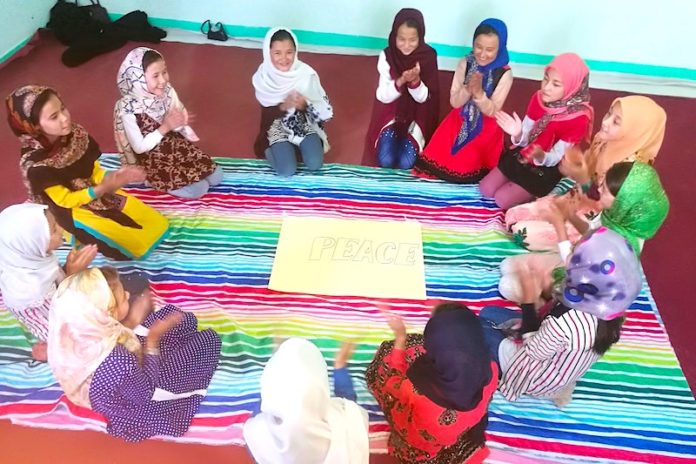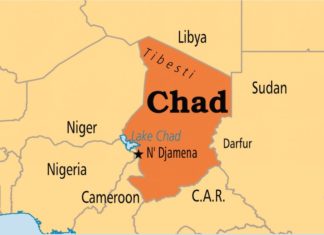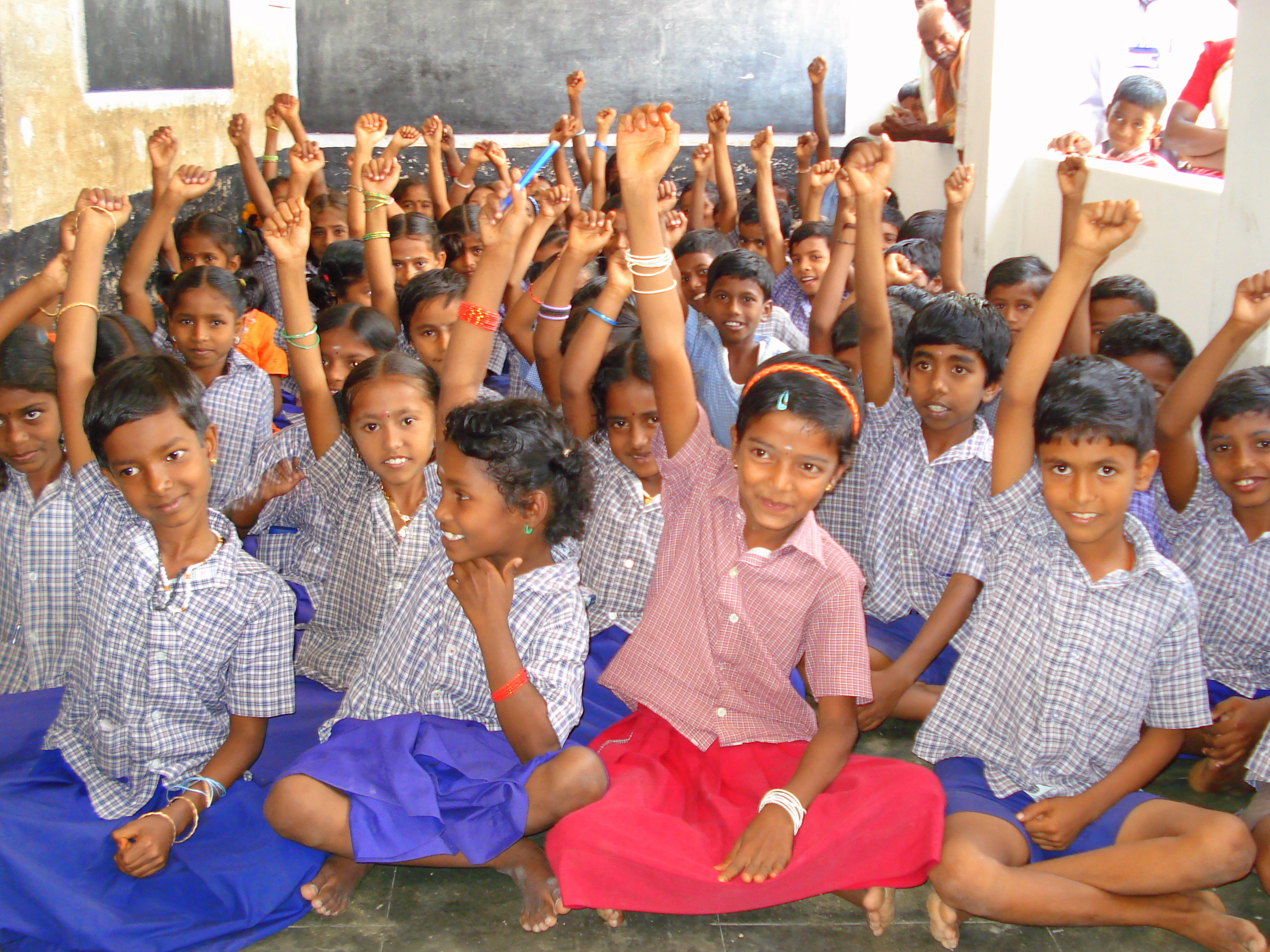By Marianela Delgado
Cooperative play is a universal way for people to come together and learn. It creates a gateway to moments when differences are celebrated, friendships are made, and people see what connects them rather than what divides them. The use of cooperative play and experiential education is proven to create more hope and compassion, build friendships across divides, and contribute to building thriving communities.
According to the United Nations, the imagination, ideals, and energy of young people are vital to the continuing development of the societies in which they live. In 2015, the Security Council, which has primary responsibility for maintaining international peace and security, unanimously adopted resolution 2250, which encouraged states to consider setting up mechanisms that would enable young people to participate meaningfully as peacebuilders to prevent violence and generate peace around the world.
Globally, one in six children lives in war zones. Life for children in regions of conflict is fraught with the risk of injuries or death.
More than 500 million people live in countries in conflict, many of them children at risk for violence and exploitation. Families face hunger, malnutrition, infectious disease, persecution, and homelessness. Children and youth are significantly affected by conflicts in their communities. Globally, one in six children lives in war zones. Life for children in regions of conflict is fraught with the risk of injuries or death.
Play for Peace, founded in 1998, is a U.S.-based, globally operating nonprofit organization that brings together children, youth, and organizations from communities in conflict, using cooperative play to create laughter, compassion, and peace.
The organization is integrated into schools, community centers, refugee camps, and local organizations. Local youth leaders are trained to conduct Practice Peace cooperative play sessions for younger children and community service projects that benefit entire neighborhoods. Currently, the organization is developing or supporting 60 groups of youth leaders.
Training of local youth volunteer leaders is carried out by a diverse global team of trainers, who go through extensive training in Play for Peace methodology before they are certified to carry out the 40-hour training process—which Play for Peace youth leaders go through to form a Play for Peace club. Every Play for Peace club is supported by an adult mentor and a local partner organization for long-term, sustainable community service and development.
Play as an experiential learning tool inspires people from different cultures to reach across barriers and boundaries. When ready, groups move beyond play and begin to include community service learning components to their interactions, effectively solving community issues together.
“Through the power of play, in space before dialogue, we bridge divides between groups. Laughing together diminishes the fear of each other, and fear is one of the most basic ingredients for intolerance, racism, and violence,” explains Sarah Gough, Executive Director of Play for Peace. “The method of cooperative play takes away the pressure of winning and losing and focuses on the process of play and group formation. At Play for Peace, everybody is invited, and everyone wins.”
The training is focused on youth leaders comprising multiple ethnic groups and functioning as cohesive working teams who are developing their Play for Peace understanding and skills. They then facilitate experiential processes and activities with children throughout the year and implement self-initiated peace-building experiences in the broader community.
The process includes three steps: play, lead, and thrive. In the first phase, educational play sessions are led by Play for Peace leadership in communities suffering from conflict, creating safe environments where people of all ages can experience the joy of play and a community that practices cooperation, inclusion, caring, and fun. Then, local youth are trained to lead their own cooperative play and community service sessions. Together with their mentor, they form a Play for Peace club to improve the lives of the local children, youth, and adults and practice their new leadership skills. Finally, new leaders are fostered to continue the cycle of peace within their communities and in new regions worldwide, promoting positive relationships across cultural, religious, and other divides and continuously growing our global learning efforts.
Youth-led cooperative play positively influences personal development, interpersonal relationships, and community cultural norms.
Youth-led cooperative play positively influences personal development, interpersonal relationships, and community cultural norms, even in the most challenging areas of the world to work. While every community is different, three primary outcomes achieve the creation and support of compassionate citizens, relationships across divides, and thriving communities.
Farheen, a mentor for the Play for Peace club in Delhi, mentors children. Despite the challenges the children face, she encourages them to think about the future and help their community through Play for Peace games. Farheen has not escaped discrimination herself. While she is differently-abled, Farheen doesn’t let her physical challenges limit her impact.
“I live in the Slums where there is much discrimination. Play for Peace does not show any discrimination,” she says.
Through her work with Play for Peace, she has found purpose, family, fun, caring, cooperation, and inclusion in the community.
Luc volunteered with the Play for Peace partner organization, a New Day Social Work Group, so that he could bring together people with diverse backgrounds and, in many cases, prejudices against one another. While participating in a workshop on LGTBQ rights, he recounted his story of growing up as a shy, gay man who wasn’t readily accepted by his family. His words greatly affected the views of Phuong, a local student who soon learned acceptance and compassion for the LGBT community.
Phuong says now he understands they are just who they are. “I am willing to make friends with them because I can see they are people just like me,” he says.
As children and young people practice Play for Peace sessions, more friendships are created between people with different backgrounds.
Rayan, an Iraqi youth who fled his country, was trained in Play for Peace at a refugee camp in Greece. He was then relocated near another refugee camp in The Netherlands. A few months later, we received an email from Roel, a staff member at the Central Organization for the Reception of Asylum Seekers, excited about Rayan and his Play for Peace work with the children in the nearby camp. Rayan and his Play for Peace club received a volunteer prize, and hope to spread Play for Peace to every refugee camp in The Netherlands.
“There is no professional in any camp in the Netherlands who is doing what Rayan is doing with his team of teens. I cannot stop speaking of this,” says Sarah Gough.
Annually, Play for Peace hosts a race to support the recruiting, training, and supporting of young people in the United States and in areas of conflict around the world to be champions of compassion in their communities. In turn, these young leaders organize and lead cooperative play-based Practice Peace Sessions and community service activities in their communities.
This past September, some of the mentors from Play for Peace took part in the month-long event, Level Up: Race for Humanity 2020. While they live in different countries, the mentors joined Play for Peace and found compassion, connection, and community, despite the conflict in their regions and the world.
“Play for Peace will help with unity and promote joy since everyone is invited to play,” says Obed Niimbere, a mentor for Play for Peace Burundi. Since the club was initiated in 2019, Obed has watched his community heal due to Play for Peace after experiencing ongoing poverty and political strife. The club began when Play for Peace trainers Sam and Sarah Towers visited Burundi, hosting peace sessions with students, teachers, and staff in six different schools. After the success of these sessions, the group in Burundi officially registered as a Play for Peace club, and Obed stayed on as a mentor to facilitate games and activities with community children. He thinks that the Level Up activities will continue to positively affect his community by creating unity and joy, especially amid COVID-19.
Ani Puvanesan, a mentor for the Breeze of Peace Club in Mullaitivu, Sri Lanka, explains, “Play for Peace is a great platform for children to gather and play different games to overcome the stress and trauma they have undergone.” In most cases, this stress is due to war, and most recently, the COVID-19 pandemic. Ani feels that the Race for Humanity will be a fantastic event and an excellent way for children to relieve the stress that COVID-19 has brought to his community, both physical and mental.
“The Play for Peace global network has helped me understand other cultures, other ways of seeing life and, above all, help locally through this family that supports us throughout the world,” says Francisco Hueyatl, a mentor volunteer for the Mexico Club. “And without a doubt being able to help in my community has been very significant.”
For Francisco, COVID-19 has been a challenging time that has affected close friends and caused an environment of sadness and hopelessness.
Francisco believes that Level Up: Race for Humanity will continue to help his club members to connect, even remotely, and work together to create compassion, connection, and community on a global level.
Because of all this impact, Play for Peace members and volunteers believe that youth-led cooperative play has the power to bring together people from different nationalities, religions, and backgrounds to find common ground, build friendships, and create a more peaceful world.
References
https://www.un.org/en/sections/issues-depth/children/index.html
https://www.un.org/en/sections/issues-depth/youth-0/index.html
https://www.un.org/youthenvoy/wp-content/uploads/2015/06/YouthStatsArmedconflictpdf2.pdf












Way cool! Some very valid points! I appreciate you penning this post and the rest of the site is also really good. Jemie Bax Meridel